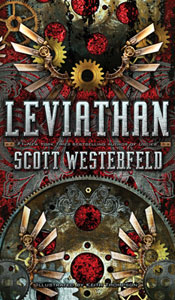
It promised a ripping yarn full of everything I mentioned previously, and it did, to an extent. What it didn't follow through on, though, was making the story interesting enough to survive without all the other trappings. The real test of a steampunk novel is if when you strip away the fantastical veneer, it still tells an interesting story, with compelling characters and a believable, but not too real setting. When you take the veneer off Leviathan, it leaves a sort of formulaic plot, and run of the mill characters. The protagonists are Deryn Sharp, a typical sort of Eowyn-esque "I wanna be a soldier but I'm a girl" character (her plotline actually has scenes that seem directly lifted from Disney's Mulan), and Aleksandar Hapsburg, who's a pretty boring "spoiled prince get's taught about the real world" type, and is also a bit of a jerk, considering that he murdered a guy in cold blood, but his character development consists mainly of him angsting over his inability to pilot a steam powered robot correctly.
Their stories would be interesting, if they went anywhere. There's no real build up of dramatic tension: Aleksandar, even though he's supposed to be running from people who want to kill him, spends a lot of time sitting around thinking, and Deryn doesn't face any conflicts in her quest to become a soldier, besides her gender, but as before, Westerfeld doesn't build up dramatic tension well enough to make me care about that conflict, or anything else in the story besides the mildly interesting technology system. Which brings me to another point: even if a certain work has a slightly predictable plot, if there are enough interesting ideas being winged your way, it doesn't matter as much. Look at Star Wars. Even though the plot is simplistic and the characters are archetypal to the point of cliche, there are so many "hey look at that, that's awesome" things happening to distract you from it.
In Leviathan, even though the genetically engineered animals and steam powered mechas are cool to look at (one good thing about this book is Keith Thompson's excellent illustrations), and the slang is just the right amount of incomprehensible and annoying to fully remind you you're reading an SF novel, there's a point at which one neat device or technology system isn't going to be as stunningly awe inspiring as it was the first time you saw it. Therein lies the issue: Leviathan doesn't have enough crazy concepts to change a dull SF novel, into a pulpy guilty pleasure, something Westerfeld's previous book Uglies did so well. And this would be fine, if the plot were interesting enough to exist on its own. As I said before, it isn't.
I know there are devoted fans of this book out there, and I fully respect their opinion on this, but for me, I thought the story and characters were dull, and there wasn't enough insane, off the wall things to keep me distracted from those shortcomings. I won't even get into the unfortunate implications of having genetically engineered animals fighting mechas in World War I. That's a review for a different day. And that's why I quit halfway through.